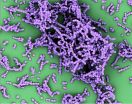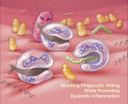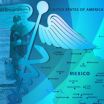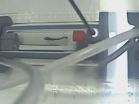(Press-News.org) An international team of scientists, led by researchers at the University of California, San Diego School of Medicine, have identified the genes encoding a molecule that famously defines Group A Streptococcus (strep), a pathogenic bacterial species responsible for more than 700 million infections worldwide each year.
The findings, published online in the June 11 issue of Cell Host & Microbe, shed new light on how strep bacteria resists the human immune system and provides a new strategy for developing a safe and broadly effective vaccine against strep throat, necrotizing fasciitis (flesh-eating disease) and rheumatic heart disease.
"Most people experience one or more painful strep throat infections as a child or young adult," said senior author Victor Nizet, MD, professor of pediatrics and pharmacy. "Developing a broadly effective and safe strep vaccine could prevent this suffering and reduce lost time and productivity at school and work, estimated to cost $2 billion annually."
Efforts to develop such a vaccine have been significantly hindered by complexities in how the human immune system reacts to the bacterial pathogen. Specifically, some patients with strep infections produce antibodies that cross-react with their own heart valve tissue, leading to rheumatic fever and heart damage. Though rare in the United States, rheumatic fever remains common in some developing countries and causes significant disability and death.
The Cell Host & Microbe study suggests a way to circumvent the damaging autoimmune response triggered by strep. Specifically, the researchers noted that the cell wall of strep is composed primarily of a single molecule known as the group A carbohydrate (or GAC) which, in turn, is built from repeating units of the bacterial sugar rhamnose and the human-like sugar N-acetylglucosamine (GlcNAc).
Previous research has indicated that GlcNAc sugars present in GAC may be responsible for triggering production of heart-damaging antibodies in some patients. Nizet said the latest findings corroborate this model, and suggest that eliminating the pathogen's ability to add GlcNAc sugars to GAC could be the basis for a safe vaccine.
"In this study, we discovered the strep genes responsible for the biosynthesis and assembly of GAC, the very molecule that defines the pathogen in clinical diagnosis," said first author Nina van Sorge, PharmD, PhD, a former postdoctoral fellow at UC San Diego who now leads her own laboratory at Utrecht University Medical Center in the Netherlands. "This discovery allowed us to generate mutant bacterial strains and study the contribution of GAC to strep disease."
The researchers found that a mutant strep strain lacking the human-like GlcNAc sugar on the GAC molecule exhibited normal bacterial growth and expressed key proteins known to be associated with strep virulence, but was easily killed when exposed to human white blood cells or serum. The mutant strep bacteria also lost the ability to produce severe disease in animal infection models
"Our studies showed that the GlcNAc sugar of GAC is a critical virulence factor allowing strep to spread in the blood and tissues," van Sorge said. "This is likely important for the rare, but deadly, complications of strep infection such as pneumonia, necrotizing fasciitis and toxic shock syndrome."
The researchers also identified a way to remove the problematic GlcNAc sugar so that a mutant form of the bacteria with only rhamnose-containing GAC could be purified and tested as a vaccine antigen.
"We showed that antibodies produced against mutant GAC antigen helped human white blood cells kill the pathogen and protected mice from lethal strep infection," said Jason Cole, PhD, a visiting project scientist from the University of Queensland, Australia, and co-lead author of the paper. "Because GAC is present in all strep strains, this may represent a safer antigen for inclusion in a universal strep vaccine."
Researchers plan to assess the new modified antigen against other candidates in advanced strep throat vaccine tests in nonhuman primates beginning later this year in Atlanta, Georgia, funded by the National Health and Medical Research Council of Australia.
"It is satisfying to find that a fundamental observation regarding the genetics and biochemistry of the pathogen can have implications not only for strep disease pathogenesis, but also for vaccine design," Nizet said.
INFORMATION:
Co-authors include Kirsten Kuipers, Anna Henningham, Ana Kasirer-Friede, Leo Lin, Samira Dahesh, Laura Shaw, Jennifer Gin, Sanford Shattil and Biswa Choudhury, UC San Diego; Ramy Aziz, Cairo University, Egypt; Evelien Berends and Suzan Rooijakkers, Utrecht University, Netherlands; Mark Davies and Gordon Dougan, Wellcome Trust Sanger Institute, United Kingdom; Fan Zhang and Richard Malley, Boston Children's Hospital; Madeleine Cunningham, University of Oklahoma; Joseph Merriman and Patrick Schlievert, University of Iowa; Julia Hüttner and Bernd Lepenies, Max Planck Institute of Colloids and Interfaces, Germany; and Mark Walker, University of Queensland, Australia.
This study was funded, in part, by the National Institutes of Health, including the UC San Diego Program in Excellence in Glycosciences, the Australian National Health and Medical Research Council, the Wellcome Trust, and the Netherlands Organization for Scientific Research.
A key step toward a safer strep vaccine
Gene discovery identifies molecular pathway to potential preventive treatment
2014-06-11
ELSE PRESS RELEASES FROM THIS DATE:
A NASA view of Tropical Cyclone Nanauk in the Arabian Sea
2014-06-11
Tropical Cyclone 02A has consolidated and strengthened over a 24 hour period between June 10 and 11 and an image from NASA's Aqua satellite showed a more rounded tropical storm, despite wind shear.
As Tropical Cyclone 02A consolidated and strengthened into a tropical storm it was re-named Nanauk. NASA's Aqua satellite passed over Nanauk on June 11 at 08:29 UTC (4:29 a.m. EDT) and the Atmospheric Infrared Sounder (AIRS) captured an infrared and near-infrared image of the storm. The near-infrared image provided an almost visible look at the clouds that revealed a well-rounded ...
Gum disease bacteria selectively disarm immune system, Penn study finds
2014-06-11
The human body is comprised of roughly 10 times more bacterial cells than human cells. In healthy people, these bacteria are typically harmless and often helpful, keeping disease-causing microbes at bay. But, when disturbances knock these bacterial populations out of balance, illnesses can arise. Periodontitis, a severe form of gum disease, is one example.
In a new study, University of Pennsylvania researchers show that bacteria responsible for many cases of periodontitis cause this imbalance, known as dysbiosis, with a sophisticated, two-prong manipulation of the human ...
Migrating north may trigger immediate health declines among Mexicans
2014-06-11
PRINCETON, N.J.—Mexican immigrants who relocate to the United States often face barriers like poorly paying jobs, crowded housing and family separation. Such obstacles – including the migration process itself – may be detrimental to the health of Mexican immigrants, especially those who have recently moved.
A study led by Princeton University's Woodrow Wilson School of Public and International Affairs finds that Mexican immigrants who relocate to the United States are more likely to experience declines in health within a short time period compared with other Mexicans. ...
New study finds Internet not responsible for dying newspapers
2014-06-11
We all know that the Internet has killed the traditional newspaper trade, right? After all, until the general population started interacting with the web in the mid-90s, the newspaper business was thriving—offering readers top notch journalism and pages of ads.
But a recently-published study finds that we may be all wrong about the role of the Internet in the decline of newspapers.
According to research by University of Chicago Booth School of Business Professor Matthew Gentzkow, assumptions about journalism are based on three false premises.
In his new paper, "Trading ...
Study shows Deepwater Horizon crude oil impairs swimming performance of juvenile mahi-mahi
2014-06-11
VIDEO:
This shows juvenile Mahi-mahi in swim tunnel, which allows scientists to monitor metabolic rate swim performance.
Click here for more information.
MIAMI – A new study led by University of Miami (UM) Rosenstiel School of Marine and Atmospheric Science scientists showed up to a 37% decrease in overall swimming performance of Deepwater Horizon oil-exposed juvenile mahi-mahi. The findings reveal the toxic effects of crude oil on ecologically and commercially valuable fish ...
Survey: Almost all adult Texans knew about Health Insurance Marketplace during open enrollment
2014-06-11
HOUSTON – (June 11, 2014) – Almost all adult Texans were aware of the Affordable Care Act's Health Insurance Marketplace before the open-enrollment period ended March 31, according to a report released today by Rice University's Baker Institute for Public Policy and the Episcopal Health Foundation.
The report also found that an estimated 2 million Texans looked for information about the Marketplace and found the federal healthcare.gov website generally helpful. Almost half of Texans who visited the site wanted to purchase insurance or check their eligibility for a ...
White bread helps boost some of the gut's 'good' microbes
2014-06-11
White-bread lovers take heart. Scientists are now reporting that this much-maligned food seems to encourage the growth of some of our most helpful inhabitants — beneficial gut bacteria. In addition to this surprising find, their study in ACS' Journal of Agricultural and Food Chemistry also revealed that when looking at effects of food on our "microbiomes," considering the whole diet, not just individual ingredients, is critical.
Sonia González and colleagues note that the bacteria in our guts, or our microbiome, play an important role in our health. When certain populations ...
Researchers uncover common heart drug's link to diabetes
2014-06-11
Hamilton, ON (June 11, 2014) - McMaster University researchers may have found a novel way to suppress the devastating side effect of statins, one of the worlds' most widely used drugs to lower cholesterol and prevent heart disease.
The research team—led by Jonathan Schertzer, assistant professor of Biochemistry and Biomedical Sciences and Canadian Diabetes Association Scholar—discovered one of the pathways that link statins to diabetes. Their findings could lead to the next generation of statins by informing potential combination therapies while taking the drug.
Approximately ...
Study identifies risk factors for hospital readmissions
2014-06-11
WINSTON-SALEM, N.C. – June 11, 2014 – Hospital readmission, an important measure of quality care, costs the United States an estimated $17 billion each year. And according to the Centers for Medicare and Medicaid Services (CMS), about half of those readmissions could be avoided.
Therefore, there is significant interest in identifying factors that influence readmission rates, especially those that can be identified prior to discharge.
To pinpoint which stroke patients are most at risk, researchers at Wake Forest Baptist Medical Center undertook a retrospective case-control ...
Peer pressure is weaker for kids to quit smoking
2014-06-11
Adolescents tend to be more powerful in influencing their friends to start smoking than in helping them to quit, according to sociologists.
In a study of adolescent friendship networks and smoking use over time, the researchers found that friends exert influence on their peers to both start and quit smoking, but the influence to start is stronger.
"What we found is that social influence matters, it leads nonsmoking friends into smoking and nonsmoking friends can turn smoking friends into nonsmokers," said Steven Haas, associate professor of sociology and demography, ...
LAST 30 PRESS RELEASES:
ASU researchers to lead AAAS panel on water insecurity in the United States
ASU professor Anne Stone to present at AAAS Conference in Phoenix on ancient origins of modern disease
Proposals for exploring viruses and skin as the next experimental quantum frontiers share US$30,000 science award
ASU researchers showcase scalable tech solutions for older adults living alone with cognitive decline at AAAS 2026
Scientists identify smooth regional trends in fruit fly survival strategies
Antipathy toward snakes? Your parents likely talked you into that at an early age
Sylvester Cancer Tip Sheet for Feb. 2026
Online exposure to medical misinformation concentrated among older adults
Telehealth improves access to genetic services for adult survivors of childhood cancers
Outdated mortality benchmarks risk missing early signs of famine and delay recognizing mass starvation
Newly discovered bacterium converts carbon dioxide into chemicals using electricity
Flipping and reversing mini-proteins could improve disease treatment
Scientists reveal major hidden source of atmospheric nitrogen pollution in fragile lake basin
Biochar emerges as a powerful tool for soil carbon neutrality and climate mitigation
Tiny cell messengers show big promise for safer protein and gene delivery
AMS releases statement regarding the decision to rescind EPA’s 2009 Endangerment Finding
Parents’ alcohol and drug use influences their children’s consumption, research shows
Modular assembly of chiral nitrogen-bridged rings achieved by palladium-catalyzed diastereoselective and enantioselective cascade cyclization reactions
Promoting civic engagement
AMS Science Preview: Hurricane slowdown, school snow days
Deforestation in the Amazon raises the surface temperature by 3 °C during the dry season
Model more accurately maps the impact of frost on corn crops
How did humans develop sharp vision? Lab-grown retinas show likely answer
Sour grapes? Taste, experience of sour foods depends on individual consumer
At AAAS, professor Krystal Tsosie argues the future of science must be Indigenous-led
From the lab to the living room: Decoding Parkinson’s patients movements in the real world
Research advances in porous materials, as highlighted in the 2025 Nobel Prize in Chemistry
Sally C. Morton, executive vice president of ASU Knowledge Enterprise, presents a bold and practical framework for moving research from discovery to real-world impact
Biochemical parameters in patients with diabetic nephropathy versus individuals with diabetes alone, non-diabetic nephropathy, and healthy controls
Muscular strength and mortality in women ages 63 to 99
[Press-News.org] A key step toward a safer strep vaccineGene discovery identifies molecular pathway to potential preventive treatment




